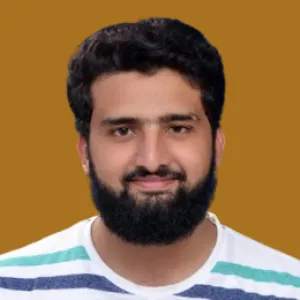Introduction
I am Engr Muhammad Haseeb Khan, a Junior Lab Engineer in the Department of Computer Science at National University of Technology Islamabad University. With over 2 years of experience in both research and the academia, my primary research interests lie in Artificial Intelligence (AI), Machine Learning, and Data Science. I am enthusiastic about exploring how data-driven models can solve real-world problems, particularly in healthcare and finance. My teaching philosophy centers around providing students with a strong theoretical foundation, while also equipping them with practical skills for the evolving tech landscape.
Experience
- Junior Lab Engineer, Department of Computer Science, National University of Technology Islamabad (Dec 2024–Present)
-
- Assisting in the setup, configuration, and maintenance of computational resources and software environments for the Computer Science department.
- Supporting faculty and students in programming, artificial intelligence, and machine learning labs.
- Conducting practical demonstrations and ensuring the smooth execution of lab sessions.
- Providing technical guidance and mentoring students on AI-related projects and research.
- Collaborating on academic and research initiatives to integrate cutting-edge AI techniques into the department’s framework.
- Performing additional coordination duties to streamline departmental operations and communication.
- Research Assistant, School of Computing Sciences, Pak-Austria Fachhochschule: Institute of Applied Sciences and Technology, Haripur (Aug 2023–Aug 2024
- Assisted in research and development of AI and machine learning models for medical imaging applications.
- Conducted data preprocessing and analysis to support research objectives.
- Collaborated with the research team to refine and test models on medical datasets.
- Contributed to the documentation and presentation of research findings.
- Engaged in literature reviews to stay updated on the latest advancements in AI and medical imaging.
- Provided technical support and troubleshooting for research-related tasks.
- Teacher Assistant, School of Computing Sciences, Pak-Austria Fachhochschule: Institute of Applied Sciences and Technology, Haripur (Oct 2022 - Feb 2023 & Feb 2024 – July 2024)
- Assisted the professor in delivering technical lectures and guiding students through complex lab tasks in subjects like machine learning and data science.
- Provided hands-on support with coding assignments, debugging scripts, and implementing machine learning models.
- Evaluated lab tasks, exams, quizzes, assignments, and semester projects, using rigorous assessment criteria to ensure academic standards and enhance student proficiency in computational methods and programming skills.
- Intern, WAPDA Powerhouse, Tarbela (Jul 2018 - Aug 2018)
- Gained hands-on experience with power transformers, electrical protection systems, and high-voltage switchgear systems.
- Acquired knowledge of SCADA systems for real-time monitoring and control of power generation and distribution.
- Assisted in technical documentation, collaborated with engineers and technicians, and learned safety protocols essential for high-voltage environments.
Qualification
- Academia:
- MS. in Artificial Intelligence, Pak-Austria Fachhochschule: Institute of Applied Sciences and Technology, Haripur (2024)
- B.Sc. in Electrical Engineering, Riphah International University Islamabad (2020)
- Certifications:
- Machine Learning Specialization – Coursera - Credential ID: QE8ELMW9T3YJ
- Image Segmentation with Python and Unsupervised Learning – Coursera - Credential ID: 5GK5QA5CAWFN
- British Airways Data Science Job Simulation on Forage - Credential ID DNMyMRgpgK8DZ7bHk
- Introduction to Data Science in Python – DataCamp
- NEBOSH International General Certificate in Occupational Health and Safety
- Managing Safely – Institution of Occupational Health and Safety
- Trainings
- PLC & SCADA – SINA Institute of Networks & Aesthetics
- Certified Fiber Optics Professional - SINA Institute of Networks & Aesthetics
Research
My research focuses on the intersection of machine learning, natural language processing, and computer vision. I am currently working on several projects that apply AI techniques to healthcare, such as developing algorithms for automated diagnosis and personalized treatment recommendations. I have received research funding from both the National Science Foundation (NSF) and private tech companies for my work on deep learning models for medical imaging.
-
- Publications: Haseeb.Khan, et al. (2024). "Optimized Feature Extraction and Classification of Pituitary Tumors from MRI Images. Submitted in IEEE Journal of Biomedical and Health Informatics
- "Pituitary Tumor Feature Extraction Methods Using MRI Images (2024): The project employs the U-Net architecture to isolate pituitary tumors from MRI images. After U-Net segmentation, features related to size, shape, and texture are extracted from the segmented tumor region using mathematical formulas. These features are then classified into micro, macro, and large adenoma categories using classifiers like SVM, Random Forest, and Gradient Boosting. The approach demonstrates high reliability and effectiveness in tumor classification.
- An Edge Server for TeleHealth System (2020): The quick headway in media transmission frameworks and the utilization of elite structural plans in implanted framework innovation have empowered the bio-clinical industry to build up a progressed clinical framework. This project proposes an Edge Server for Telehealth (EST) that reduces limitations in patient examination faced by specialists. The telehealth device is evaluated on a dual-core low-power core with Linux-lite OS, while the edge server uses an Intel i7 processor with 8GB DDR RAM and 256GB ROM, demonstrating effectiveness in real-time disease diagnosis applications.
